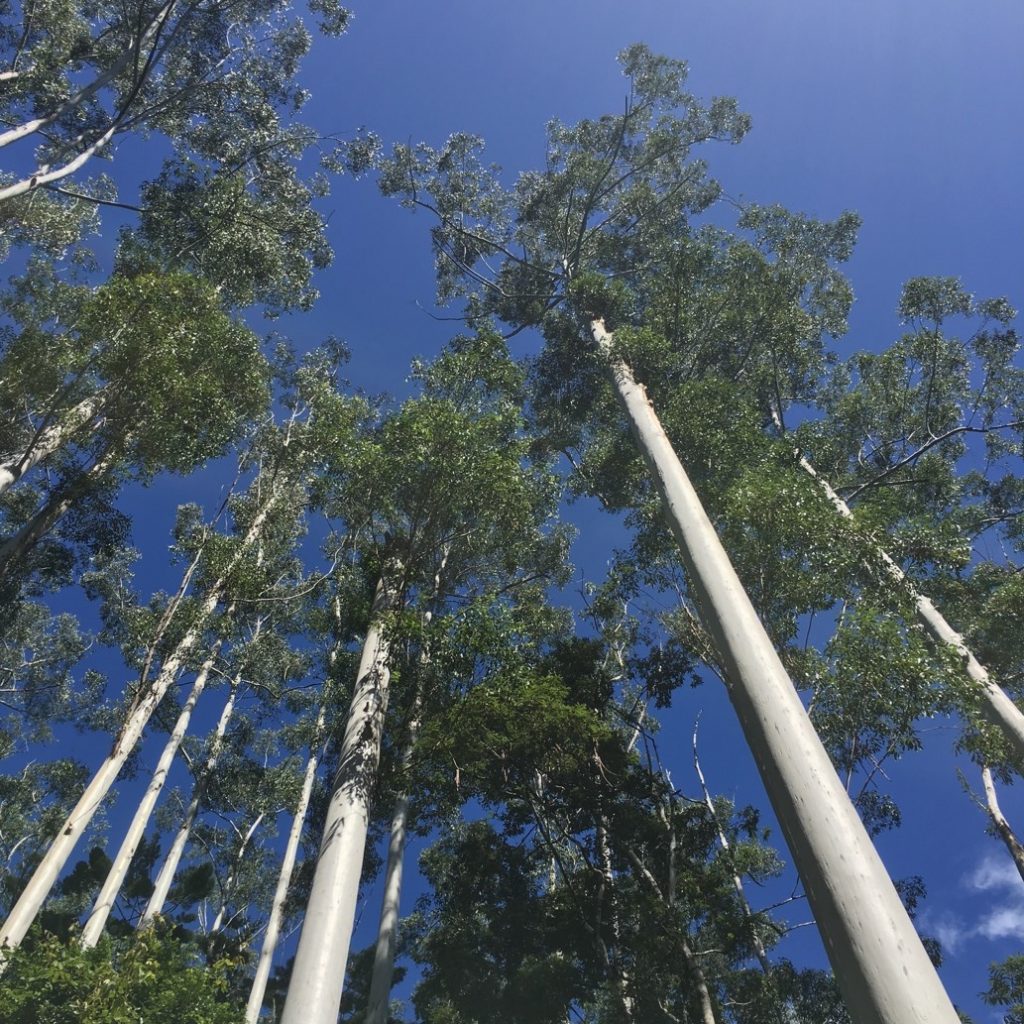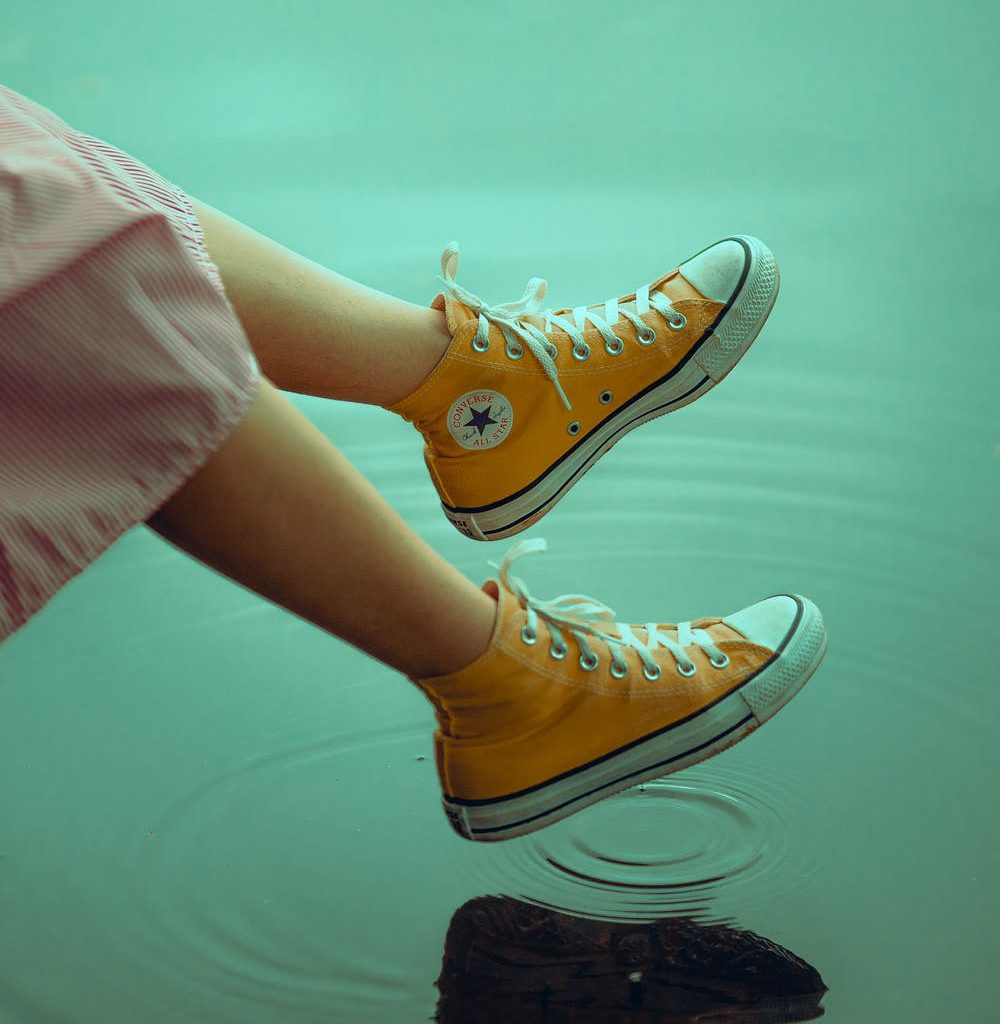My Relationship with the Natural World
My relationship with the natural world is pretty close. I grew up in the rural area. My earliest memories are running around in the bush, climbing trees and hugging them. Flooded gums are my favourite tree. As a girl, I used to make a backrest out of a scarf and sit in the tree, listening to the birds.

These days, I get to enjoy creeks and rivers, camp in wonderful bush land and hear all sorts of birds singing during the day, and grey noise bugs and animals at night to go to sleep too. I get to see beautiful flowers and smell them. I take care of the earth by picking up rubbish when I see it, weeding and not taking it for granted.
Learning about the impacts of climate change has made me frustrated and stressed, particularly when faced with climate deniers. What I have found to help is to be around others with the same beliefs and talking about the ridiculousness of climate deniers.
I am most troubled by the fluctuating weather phenomenon happening in our country, such as bushfires, lack of rain and not as many thunder storms as when I was a child. I always say ‘if I can notice the different weather patterns in my life time, then something is happening and there is no denying it.’
It’s important for me to care for the planet and the life on it, human and animal. I believe in protecting our futures and the future generations, being environmentally aware and my climate footprint. What troubles me is that not everyone is like this; they dismiss the evidence.
The history of my values and ethics comes from seeing the impact of climate change within my own life time and from hearing the stories of others growing up. I heard stories from my mother about what it was like to live off the land while they were building their house in the 70’s and 80’s. I watched my mother cut back her carbon footprint and use less water. My mother was an activist who was part of the group that stopped mining in our area and protested against the Vietnam War. I also grew up with dreamtime stories from the Gumbaynggirr people. I learnt that you had to be respectful of the land, where you go and how you treat animals and nature
When I hear of others changing their ways, I have come to realise the impact of climate change. I’ve grown up already doing things that are important. I conserve water by not leaving the tap on when brushing my teeth or washing my hands or face. I don’t use tissues and instead use handkerchiefs. I don’t keep lights on so I don’t waste electricity and use energy saving power boards.
Standing Strong in the Face of Uncertain Times
I feel hopeful when I see others who share the same beliefs as I do, not allow climate deniers get them down. Sometimes climate deniers realise they were wrong and change their tune. Something that gives me strength is the amount of people that are finally understanding that climate change is a thing and it’s not going to go away. It gives me hope seeing people my age [young people] fighting for change.
Nature for me has developed my strong beliefs due to living in the country and not in a large city, where I’m surrounded by trees and animals and not steel buildings with zero life to them. I’m aware of the world and the effects of climate changes on it. I don’t waste water by leaving the tap on, I only wash clothes when I have a full load and I won’t put things in the wash if I’ve only worn it for a few hours. I’m aware of my impact on the planet and I try not to waste resources. I tell others when I can of ways to lessen their climate impact, in particular friends and young family members.
Standing up to Anxiety
Anxiety has been part of my world for a long time. When it comes to the topic of the Climate Change and its impact on the environment, Anxiety has a lot to say about it. I recently wrote a dialogue that explores the values and beliefs of the world of Anxiety and how this compares to my own worldview. This dialogue features The Shadow as the voice of Anxiety and Bright as my preferred self.
Setting (Shadow and Bright are sitting, back to back, in a room with nothing in it. The shadow is growing larger, consistently shifting, it’s quiet.)
(words drift through the room, like thoughts of their person.)
Shadow: This again…
Bright: This is always a stressful subject.
Shadow: They have all these thoughts about the environment and it does nothing. Do nothing person, a talker, not a doer.
Bright: Another voice joining others, it’s one less person that others have to fight against to get things done. They don’t oppose climate action, not going to fight against them.
Shadow: Belief without action does nothing.
Bright: And forcing others into believing their beliefs causes turmoil. Just supporting others helps.
Shadow: But nothing is going to change, it’s been over 40 years since people started to realise that climate change was going to happen if they didn’t do something. And yet? There are still deniers. What’s the point?
Bright: Well, yes. (Bright started to shine just a little more.) That doesn’t mean they can just give up. They still help by being aware of the problem.
Shadow: Being aware of it means crap. Just brings more worry. (Shadow shifted, as if flinching from Bright.) If nothing is going to change no matter what, then they may as well hide away.
Bright: No! Sure, they don’t have to be out there and trying to force others to realise the truth. Forcing their belief onto others isn’t right, no one should do that whatsoever, it just causes pain and suffering. Too much blood shed has happened because of that. But they can help in little ways, they do help in little ways. Even if they don’t go out and participate in big marches or go door to door and bring awareness.
Shadow: But that is what everyone else is doing! (The shadow stood up, yelling at the room, shifting in the form of their target.) If they’re not doing what everyone else is doing, then they’re not doing anything at all!
Bright: That’s not true. They are helping. They don’t waste water, nor do they use chemicals that hurts the environment. And even if they’re not going out and marching, in a way, that helps too! No petrol being used to take you there! (Bright smiled, in its formless way. The inner light within them began to glow.) They don’t use paper towels; they use tea towels! Wherever they can, they find ways to use big jars when finished with them. They reuse plastic bags instead of throwing them away. So you see, they are doing their part for the environment.
Shadow: (Growing ever smaller, hissed.) Not everyone else does, why do they have to take care and worry about all of this when there are people out there who don’t? It’s unfair!
Bright: They aren’t those people. they don’t have to do what everyone else is doing. Just doing their part of the environment, by lowering their carbon footprint is good enough. Not being part of the opposition for those that want to fight for change in our world to help save it, helps.
(Shadow was banished, the light in the room was too much, and even if the shadow gets bigger the closer to the light, it can also be overwhelmed. It’s still there, but the bright light prevents it from gaining ground.)
Bright: (smiling up at the roof) Small things help in a big way.
Future Actions

If I could, I would try and stop climate action being less about politics and more about common sense; actually doing something about it that doesn’t involve numbers but instead just helping the environment. I’d like to spread awareness about water wasting, the ways anyone can cut back on how much water they use even in small ways in their own homes, as it is something everyone in every household can do, whether it is in the country or in an apartment in the city.
I will tell people when washing the dishes don’t use more than one sink of hot water, only wash dishes once a day whenever possible. Don’t have a shower every day, every second day instead and don’t have long ones. Ten minutes is fine and if you have to shave, turn off the water when you do to preserve water. When cleaning, don’t use resources that you have to toss away like paper wipes, use rags. Don’t flush all the time at home. ‘if it’s yellow let it mellow, ifs it brown, flush it down.’
I would love to find a place to spread awareness of water wasting and to show these techniques in action. I would provide information for those that are cleanliness worriers, that my ideas won’t make them sick or their kids sick.
If this story has touched you in some way, we invite you to send a message back to the storyteller. Please go to our ‘Facing the Climate Crisis’ project page for details.
